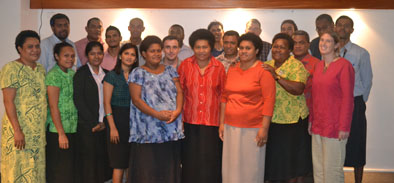This story is from LRD-SPC web site on a workshop I just organised and co-delivered with Marita Manley of GIZ.
Every time we go to the supermarket to buy a few groceries we look for answers to several questions about a product before committing to a purchase. How much does the item cost? What is the volume? How quick is it to prepare? What is its nutritional value? Where is it made? What are the ingredients? Unknowingly, we are conducting a cost-benefit analysis of the product, examining its dollar value stacked up against the inputs that went into producing the product, and making an informed decision about whether to buy it or not.
This is similar to the way we might appraise an agricultural project. However in this case we can carry out an economic assessment and the net value of a project.
A workshop taking place this week at the Secretariat of the Pacific Community (SPC) Suva office is examining just this practice: the use of cost-benefit analysis as a tool and an economic framework to appraise agricultural projects. More than 15 staff of the Fiji Ministry of Primary Industries requested SPC Suva to conduct training in this key decision-making tool. Colleagues from Land Resources Division are also attending the workshop. The workshop is facilitated by the SPC Land Resources Division in collaboration with GIZ (Deutsche Gesellschaft für Internationale Zusammenarbeit) and SPC’s Applied Geoscience and Technology (SOPAC) Division and funded by the Fiji Ministry of Primary Industry.
Workshop trainer and SPC-SOPAC Economic Analysis Adviser Dr Paula Holland commented in her opening remarks that cost benefit analysis is a tool designed to answer the question, “is this project worth doing?” She said that it is a tool that aids decision-makers to maximise the economic impact of their work and that it is used to analyse the merits of a project from the perspective of society, rather than the individual.
Cost benefit analysis is not all about numbers. It takes into account socio-economic as well as environmental costs. It is a crucial additional tool for governments, regional organisations and donor agencies, and can be used at the project design stage, when prioritising the allocation of resources among projects, and for monitoring and evaluation.
In the Pacific the agriculture and forestry sector contributes a significant proportion of the Gross Domestic Product and export earnings, and provide subsistence production, cash income, customary gifts and livelihoods for rural communities. Resources including people, time, money and skills are scarce thus the need to weigh the benefits and costs of different policy and project options available to avoid wasted public and donor funds.
From an economic perspective, the agriculture and forestry sector faces many challenges. One such challenge is stagnant or declining growth. In addition, a significant number of Pacific Islanders face food security issues, and land degradation and soil erosion are impacting sustained yields, revenues and livelihoods. Increased imports and consumption of imported food and agricultural products leads to higher trade deficits and poor nutrition.
However, our land resources are not being used to their fullest potential. Farmers often do not have access to credit to buy inputs. Climate change could bring significant costs. Given all of these factors, there has never been a greater need to pick projects that make good use of available resources to bring about sustainable development. Cost benefit analysis can help decision-makers make rational choices about distribution of resources; however it is not widely carried out in the Pacific. The workshop will empower agricultural workers to conduct their own cost benefit analyses.
Workshop presenters include Jonathan Bower, United Kingdom Overseas Development Institute Resource Economist working with SPC’s Land Resources Division, and Marita Manley, GIZ Climate Change Adviser and Resource Economist. The workshop started on Monday 23th and will end on Wednesday 25th April. For more information, please contact Jonathan Bower ( jonathanb [at] spc.int ), or Emil Adams ( emila [at] spc.int )
